LCBS5001 Strategic Management: Vodafone's UK Business Strategy Report
VerifiedAdded on 2023/01/18
|16
|4639
|21
Report
AI Summary
This report provides a comprehensive analysis of Vodafone's strategic management, focusing on its operations within the UK market. It begins with an introduction to Vodafone's background and its position as a leading telecommunications company, highlighting its growth through acquisitions and its current strategic objectives. The report then evaluates Vodafone's business strategy, examining its resources, capabilities, and strategic choices, including growth strategies and strategic options. A detailed SWOT analysis assesses Vodafone's strengths, weaknesses, opportunities, and threats, while a five forces analysis evaluates the competitive landscape. The report also considers the WARFARE perspective and identifies the reasons behind Vodafone's success in the UK. Finally, it concludes with future scope and recommendations, offering insights into how Vodafone can maintain its competitive edge and manage its strategies effectively.

LCBS5001/2 Strategic Management
Paraphrase This Document
Need a fresh take? Get an instant paraphrase of this document with our AI Paraphraser
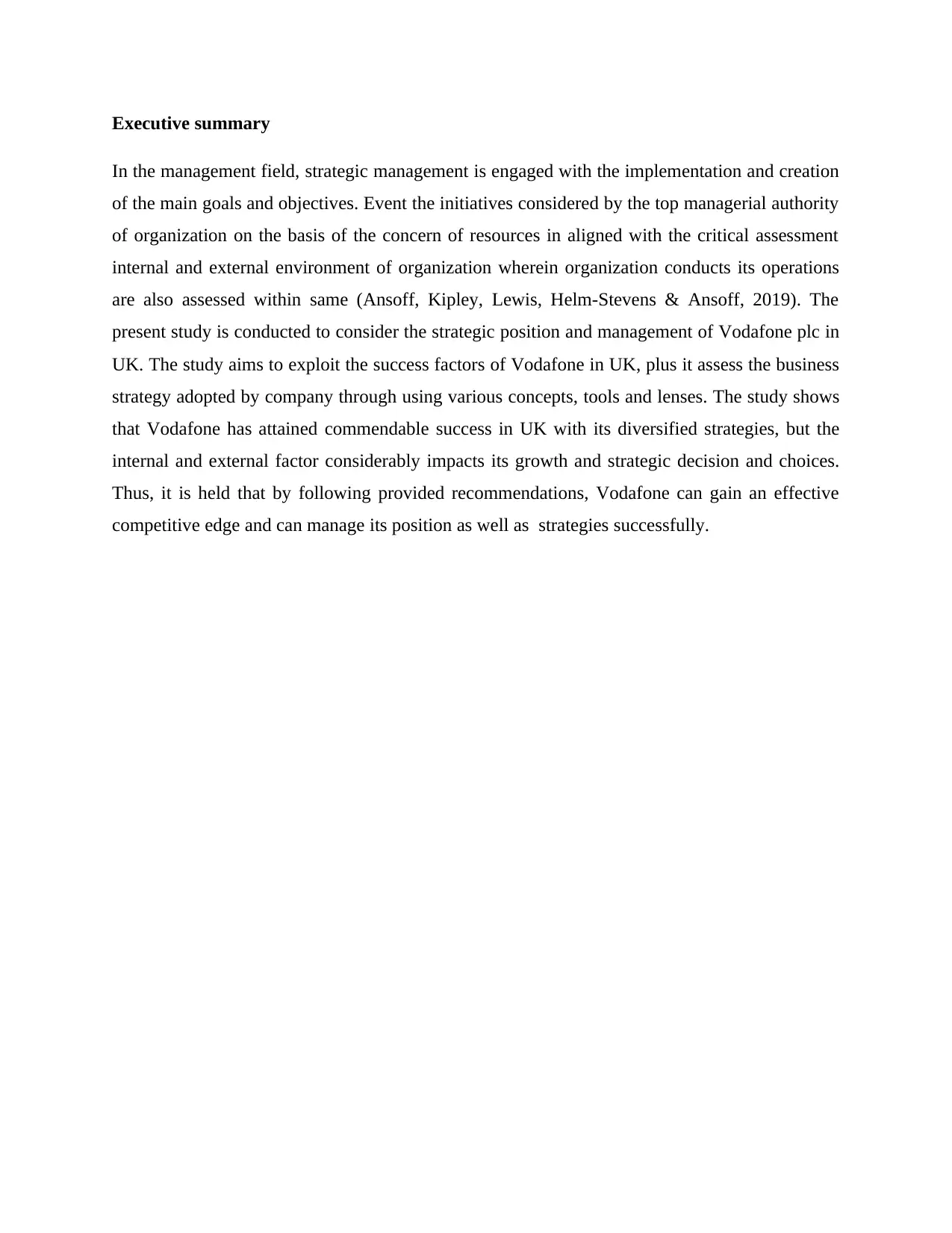
Executive summary
In the management field, strategic management is engaged with the implementation and creation
of the main goals and objectives. Event the initiatives considered by the top managerial authority
of organization on the basis of the concern of resources in aligned with the critical assessment
internal and external environment of organization wherein organization conducts its operations
are also assessed within same (Ansoff, Kipley, Lewis, Helm-Stevens & Ansoff, 2019). The
present study is conducted to consider the strategic position and management of Vodafone plc in
UK. The study aims to exploit the success factors of Vodafone in UK, plus it assess the business
strategy adopted by company through using various concepts, tools and lenses. The study shows
that Vodafone has attained commendable success in UK with its diversified strategies, but the
internal and external factor considerably impacts its growth and strategic decision and choices.
Thus, it is held that by following provided recommendations, Vodafone can gain an effective
competitive edge and can manage its position as well as strategies successfully.
In the management field, strategic management is engaged with the implementation and creation
of the main goals and objectives. Event the initiatives considered by the top managerial authority
of organization on the basis of the concern of resources in aligned with the critical assessment
internal and external environment of organization wherein organization conducts its operations
are also assessed within same (Ansoff, Kipley, Lewis, Helm-Stevens & Ansoff, 2019). The
present study is conducted to consider the strategic position and management of Vodafone plc in
UK. The study aims to exploit the success factors of Vodafone in UK, plus it assess the business
strategy adopted by company through using various concepts, tools and lenses. The study shows
that Vodafone has attained commendable success in UK with its diversified strategies, but the
internal and external factor considerably impacts its growth and strategic decision and choices.
Thus, it is held that by following provided recommendations, Vodafone can gain an effective
competitive edge and can manage its position as well as strategies successfully.
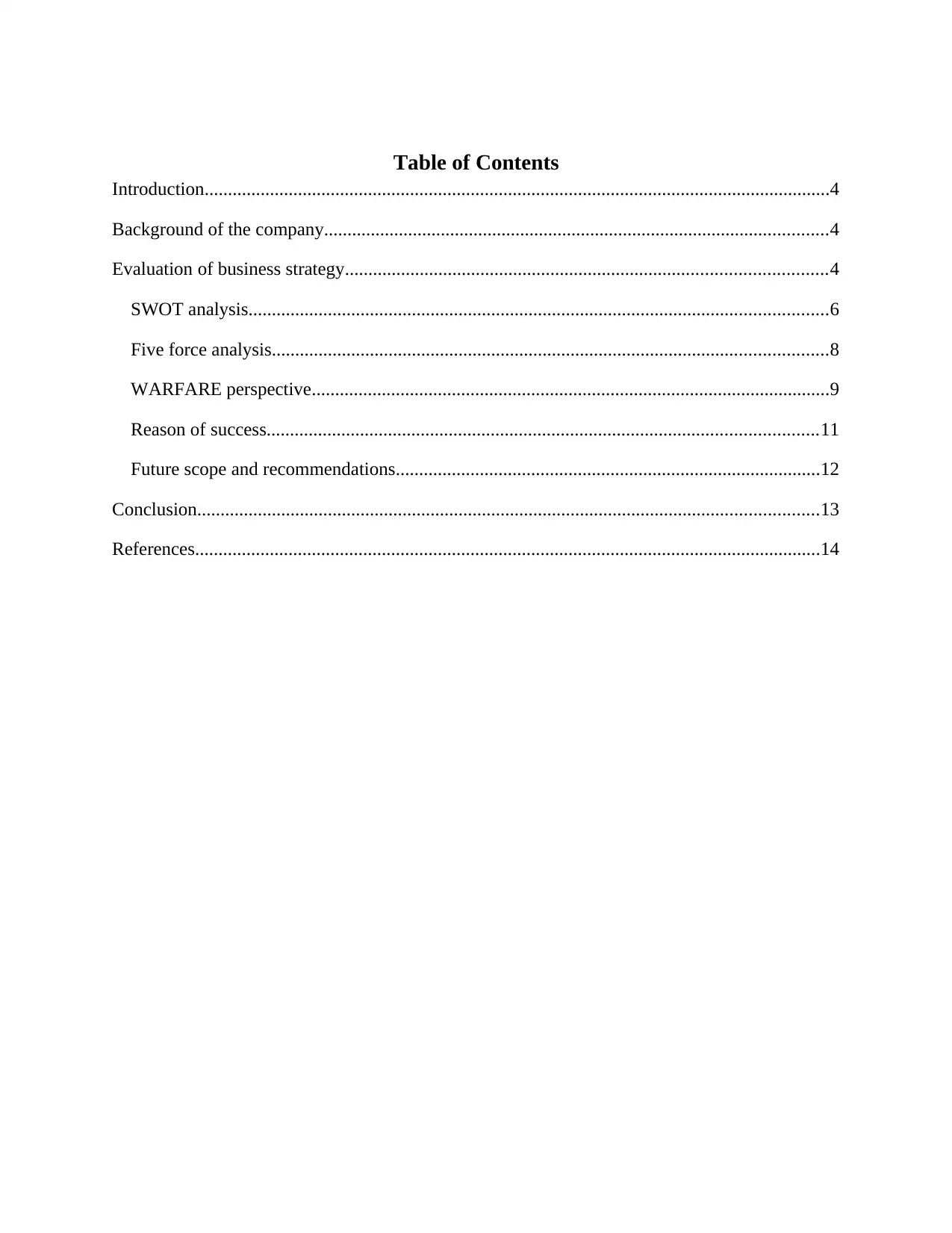
Table of Contents
Introduction......................................................................................................................................4
Background of the company............................................................................................................4
Evaluation of business strategy.......................................................................................................4
SWOT analysis............................................................................................................................6
Five force analysis.......................................................................................................................8
WARFARE perspective...............................................................................................................9
Reason of success......................................................................................................................11
Future scope and recommendations...........................................................................................12
Conclusion.....................................................................................................................................13
References......................................................................................................................................14
Introduction......................................................................................................................................4
Background of the company............................................................................................................4
Evaluation of business strategy.......................................................................................................4
SWOT analysis............................................................................................................................6
Five force analysis.......................................................................................................................8
WARFARE perspective...............................................................................................................9
Reason of success......................................................................................................................11
Future scope and recommendations...........................................................................................12
Conclusion.....................................................................................................................................13
References......................................................................................................................................14
⊘ This is a preview!⊘
Do you want full access?
Subscribe today to unlock all pages.

Trusted by 1+ million students worldwide
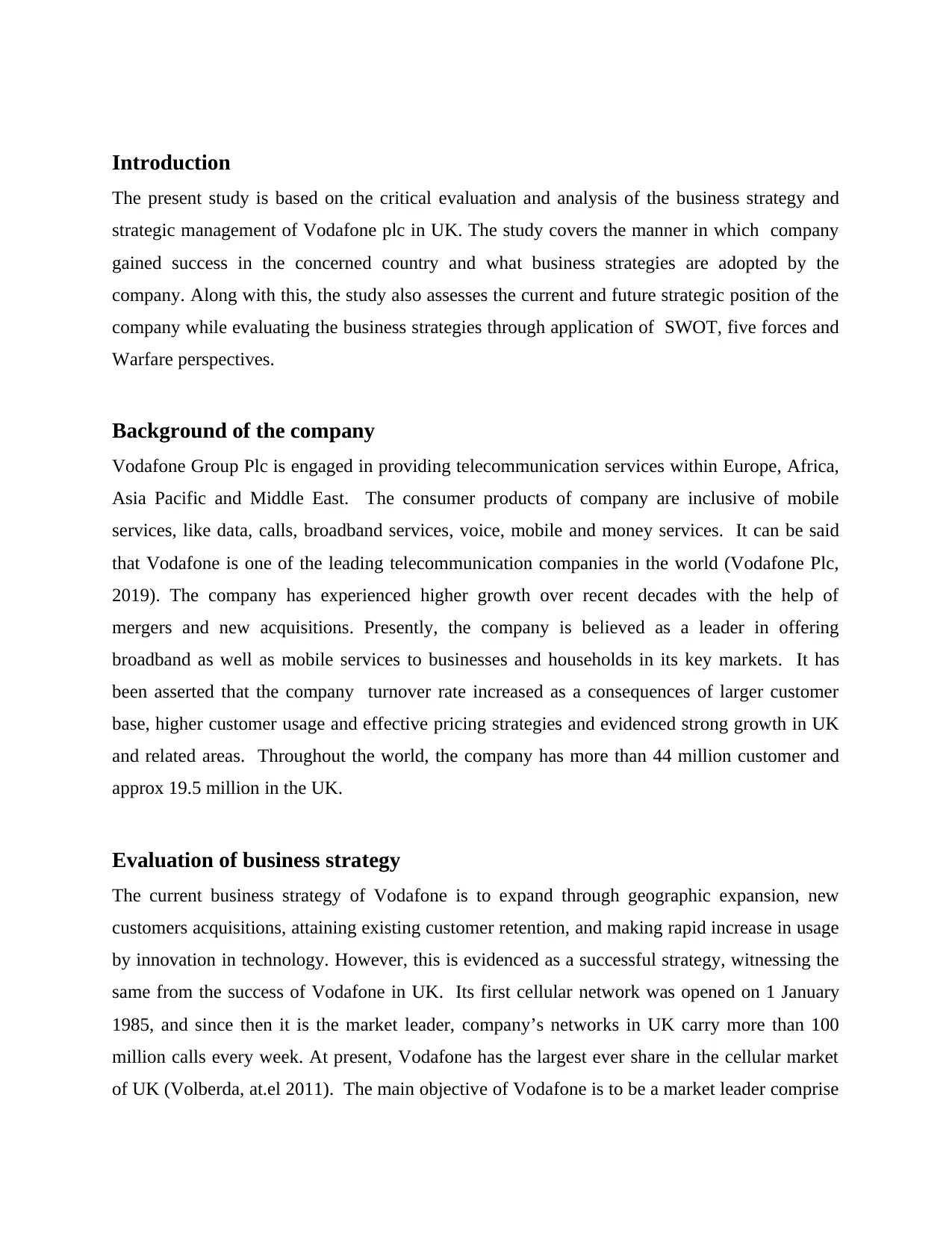
Introduction
The present study is based on the critical evaluation and analysis of the business strategy and
strategic management of Vodafone plc in UK. The study covers the manner in which company
gained success in the concerned country and what business strategies are adopted by the
company. Along with this, the study also assesses the current and future strategic position of the
company while evaluating the business strategies through application of SWOT, five forces and
Warfare perspectives.
Background of the company
Vodafone Group Plc is engaged in providing telecommunication services within Europe, Africa,
Asia Pacific and Middle East. The consumer products of company are inclusive of mobile
services, like data, calls, broadband services, voice, mobile and money services. It can be said
that Vodafone is one of the leading telecommunication companies in the world (Vodafone Plc,
2019). The company has experienced higher growth over recent decades with the help of
mergers and new acquisitions. Presently, the company is believed as a leader in offering
broadband as well as mobile services to businesses and households in its key markets. It has
been asserted that the company turnover rate increased as a consequences of larger customer
base, higher customer usage and effective pricing strategies and evidenced strong growth in UK
and related areas. Throughout the world, the company has more than 44 million customer and
approx 19.5 million in the UK.
Evaluation of business strategy
The current business strategy of Vodafone is to expand through geographic expansion, new
customers acquisitions, attaining existing customer retention, and making rapid increase in usage
by innovation in technology. However, this is evidenced as a successful strategy, witnessing the
same from the success of Vodafone in UK. Its first cellular network was opened on 1 January
1985, and since then it is the market leader, company’s networks in UK carry more than 100
million calls every week. At present, Vodafone has the largest ever share in the cellular market
of UK (Volberda, at.el 2011). The main objective of Vodafone is to be a market leader comprise
The present study is based on the critical evaluation and analysis of the business strategy and
strategic management of Vodafone plc in UK. The study covers the manner in which company
gained success in the concerned country and what business strategies are adopted by the
company. Along with this, the study also assesses the current and future strategic position of the
company while evaluating the business strategies through application of SWOT, five forces and
Warfare perspectives.
Background of the company
Vodafone Group Plc is engaged in providing telecommunication services within Europe, Africa,
Asia Pacific and Middle East. The consumer products of company are inclusive of mobile
services, like data, calls, broadband services, voice, mobile and money services. It can be said
that Vodafone is one of the leading telecommunication companies in the world (Vodafone Plc,
2019). The company has experienced higher growth over recent decades with the help of
mergers and new acquisitions. Presently, the company is believed as a leader in offering
broadband as well as mobile services to businesses and households in its key markets. It has
been asserted that the company turnover rate increased as a consequences of larger customer
base, higher customer usage and effective pricing strategies and evidenced strong growth in UK
and related areas. Throughout the world, the company has more than 44 million customer and
approx 19.5 million in the UK.
Evaluation of business strategy
The current business strategy of Vodafone is to expand through geographic expansion, new
customers acquisitions, attaining existing customer retention, and making rapid increase in usage
by innovation in technology. However, this is evidenced as a successful strategy, witnessing the
same from the success of Vodafone in UK. Its first cellular network was opened on 1 January
1985, and since then it is the market leader, company’s networks in UK carry more than 100
million calls every week. At present, Vodafone has the largest ever share in the cellular market
of UK (Volberda, at.el 2011). The main objective of Vodafone is to be a market leader comprise
Paraphrase This Document
Need a fresh take? Get an instant paraphrase of this document with our AI Paraphraser
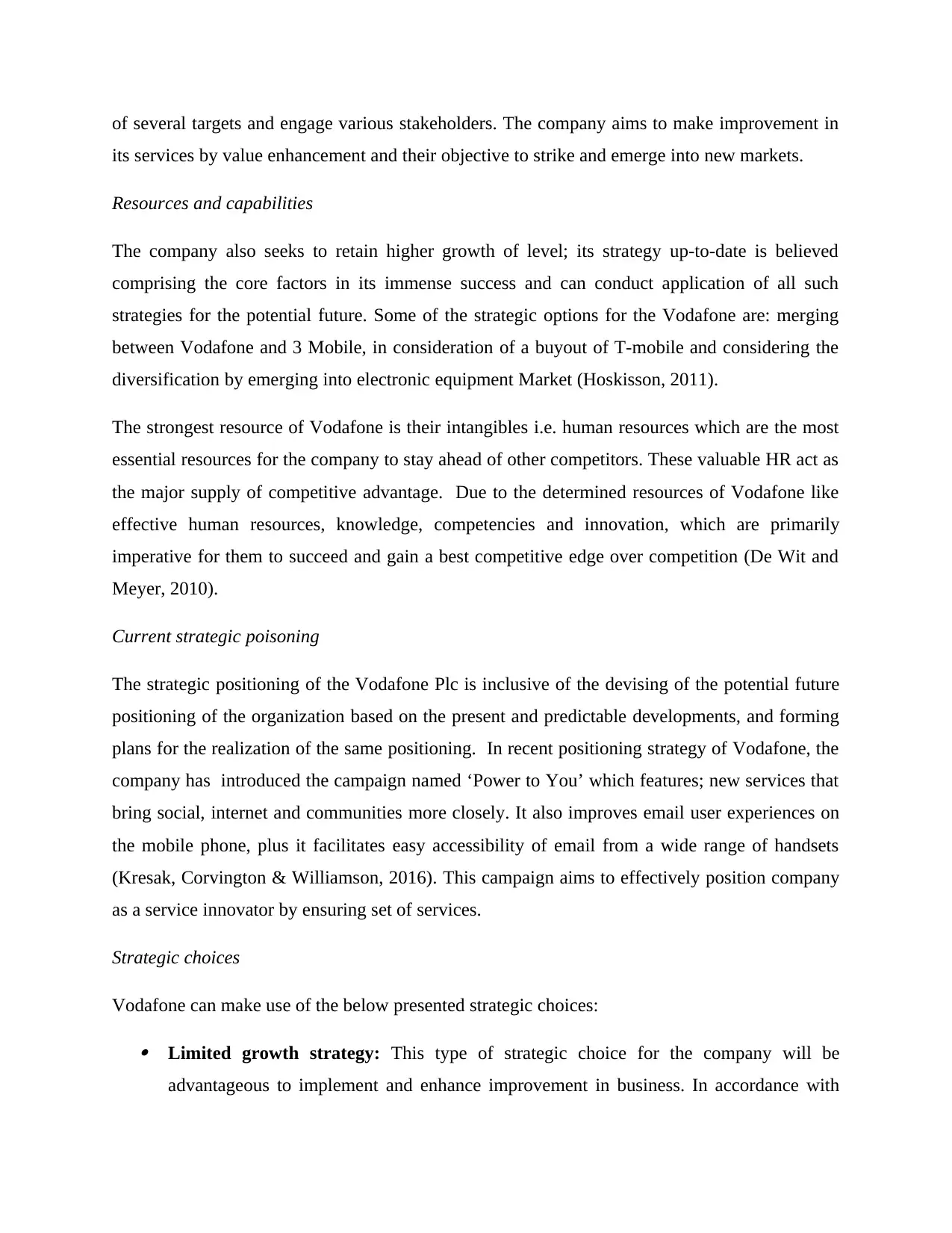
of several targets and engage various stakeholders. The company aims to make improvement in
its services by value enhancement and their objective to strike and emerge into new markets.
Resources and capabilities
The company also seeks to retain higher growth of level; its strategy up-to-date is believed
comprising the core factors in its immense success and can conduct application of all such
strategies for the potential future. Some of the strategic options for the Vodafone are: merging
between Vodafone and 3 Mobile, in consideration of a buyout of T-mobile and considering the
diversification by emerging into electronic equipment Market (Hoskisson, 2011).
The strongest resource of Vodafone is their intangibles i.e. human resources which are the most
essential resources for the company to stay ahead of other competitors. These valuable HR act as
the major supply of competitive advantage. Due to the determined resources of Vodafone like
effective human resources, knowledge, competencies and innovation, which are primarily
imperative for them to succeed and gain a best competitive edge over competition (De Wit and
Meyer, 2010).
Current strategic poisoning
The strategic positioning of the Vodafone Plc is inclusive of the devising of the potential future
positioning of the organization based on the present and predictable developments, and forming
plans for the realization of the same positioning. In recent positioning strategy of Vodafone, the
company has introduced the campaign named ‘Power to You’ which features; new services that
bring social, internet and communities more closely. It also improves email user experiences on
the mobile phone, plus it facilitates easy accessibility of email from a wide range of handsets
(Kresak, Corvington & Williamson, 2016). This campaign aims to effectively position company
as a service innovator by ensuring set of services.
Strategic choices
Vodafone can make use of the below presented strategic choices:
Limited growth strategy: This type of strategic choice for the company will be
advantageous to implement and enhance improvement in business. In accordance with
its services by value enhancement and their objective to strike and emerge into new markets.
Resources and capabilities
The company also seeks to retain higher growth of level; its strategy up-to-date is believed
comprising the core factors in its immense success and can conduct application of all such
strategies for the potential future. Some of the strategic options for the Vodafone are: merging
between Vodafone and 3 Mobile, in consideration of a buyout of T-mobile and considering the
diversification by emerging into electronic equipment Market (Hoskisson, 2011).
The strongest resource of Vodafone is their intangibles i.e. human resources which are the most
essential resources for the company to stay ahead of other competitors. These valuable HR act as
the major supply of competitive advantage. Due to the determined resources of Vodafone like
effective human resources, knowledge, competencies and innovation, which are primarily
imperative for them to succeed and gain a best competitive edge over competition (De Wit and
Meyer, 2010).
Current strategic poisoning
The strategic positioning of the Vodafone Plc is inclusive of the devising of the potential future
positioning of the organization based on the present and predictable developments, and forming
plans for the realization of the same positioning. In recent positioning strategy of Vodafone, the
company has introduced the campaign named ‘Power to You’ which features; new services that
bring social, internet and communities more closely. It also improves email user experiences on
the mobile phone, plus it facilitates easy accessibility of email from a wide range of handsets
(Kresak, Corvington & Williamson, 2016). This campaign aims to effectively position company
as a service innovator by ensuring set of services.
Strategic choices
Vodafone can make use of the below presented strategic choices:
Limited growth strategy: This type of strategic choice for the company will be
advantageous to implement and enhance improvement in business. In accordance with
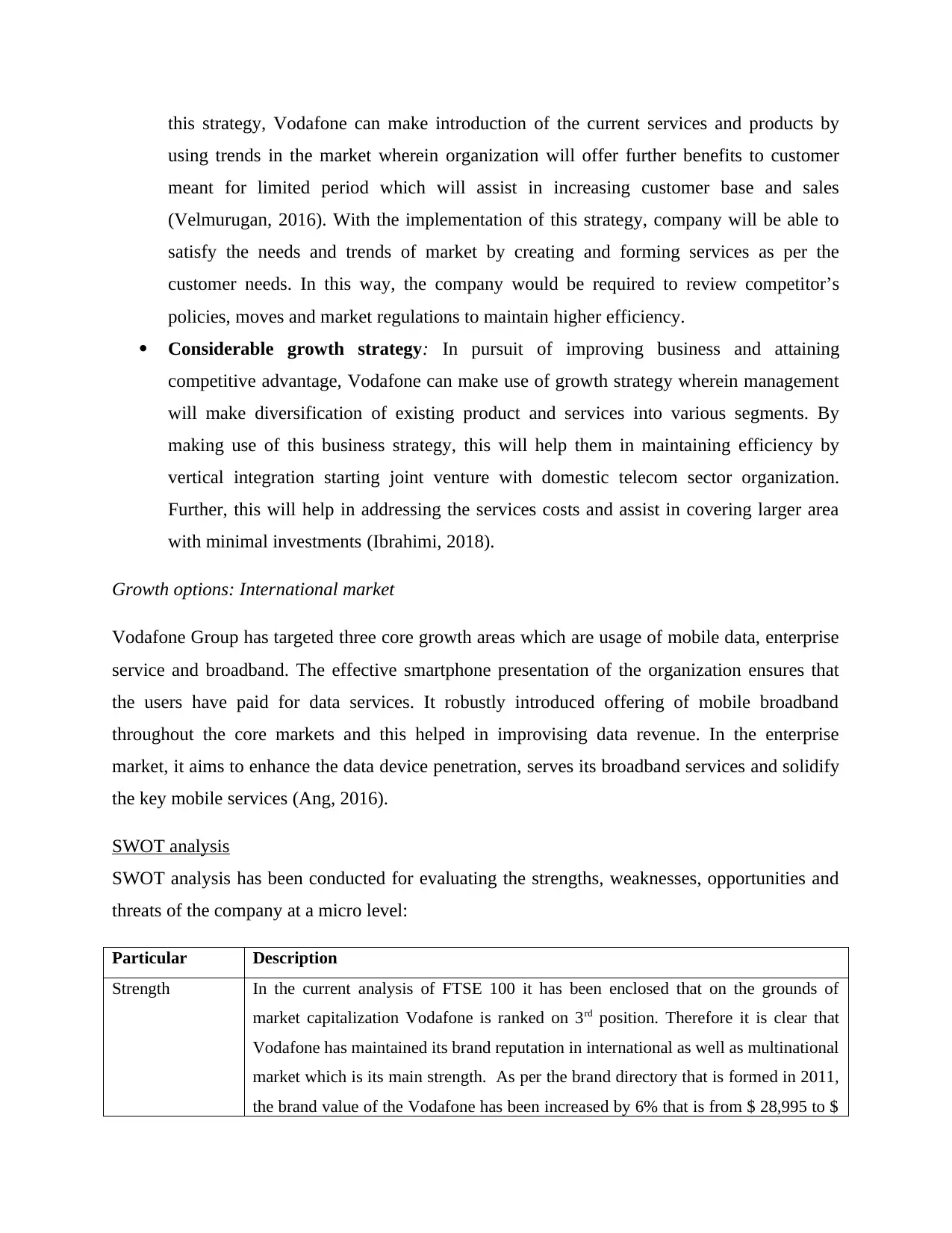
this strategy, Vodafone can make introduction of the current services and products by
using trends in the market wherein organization will offer further benefits to customer
meant for limited period which will assist in increasing customer base and sales
(Velmurugan, 2016). With the implementation of this strategy, company will be able to
satisfy the needs and trends of market by creating and forming services as per the
customer needs. In this way, the company would be required to review competitor’s
policies, moves and market regulations to maintain higher efficiency.
Considerable growth strategy: In pursuit of improving business and attaining
competitive advantage, Vodafone can make use of growth strategy wherein management
will make diversification of existing product and services into various segments. By
making use of this business strategy, this will help them in maintaining efficiency by
vertical integration starting joint venture with domestic telecom sector organization.
Further, this will help in addressing the services costs and assist in covering larger area
with minimal investments (Ibrahimi, 2018).
Growth options: International market
Vodafone Group has targeted three core growth areas which are usage of mobile data, enterprise
service and broadband. The effective smartphone presentation of the organization ensures that
the users have paid for data services. It robustly introduced offering of mobile broadband
throughout the core markets and this helped in improvising data revenue. In the enterprise
market, it aims to enhance the data device penetration, serves its broadband services and solidify
the key mobile services (Ang, 2016).
SWOT analysis
SWOT analysis has been conducted for evaluating the strengths, weaknesses, opportunities and
threats of the company at a micro level:
Particular Description
Strength In the current analysis of FTSE 100 it has been enclosed that on the grounds of
market capitalization Vodafone is ranked on 3rd position. Therefore it is clear that
Vodafone has maintained its brand reputation in international as well as multinational
market which is its main strength. As per the brand directory that is formed in 2011,
the brand value of the Vodafone has been increased by 6% that is from $ 28,995 to $
using trends in the market wherein organization will offer further benefits to customer
meant for limited period which will assist in increasing customer base and sales
(Velmurugan, 2016). With the implementation of this strategy, company will be able to
satisfy the needs and trends of market by creating and forming services as per the
customer needs. In this way, the company would be required to review competitor’s
policies, moves and market regulations to maintain higher efficiency.
Considerable growth strategy: In pursuit of improving business and attaining
competitive advantage, Vodafone can make use of growth strategy wherein management
will make diversification of existing product and services into various segments. By
making use of this business strategy, this will help them in maintaining efficiency by
vertical integration starting joint venture with domestic telecom sector organization.
Further, this will help in addressing the services costs and assist in covering larger area
with minimal investments (Ibrahimi, 2018).
Growth options: International market
Vodafone Group has targeted three core growth areas which are usage of mobile data, enterprise
service and broadband. The effective smartphone presentation of the organization ensures that
the users have paid for data services. It robustly introduced offering of mobile broadband
throughout the core markets and this helped in improvising data revenue. In the enterprise
market, it aims to enhance the data device penetration, serves its broadband services and solidify
the key mobile services (Ang, 2016).
SWOT analysis
SWOT analysis has been conducted for evaluating the strengths, weaknesses, opportunities and
threats of the company at a micro level:
Particular Description
Strength In the current analysis of FTSE 100 it has been enclosed that on the grounds of
market capitalization Vodafone is ranked on 3rd position. Therefore it is clear that
Vodafone has maintained its brand reputation in international as well as multinational
market which is its main strength. As per the brand directory that is formed in 2011,
the brand value of the Vodafone has been increased by 6% that is from $ 28,995 to $
⊘ This is a preview!⊘
Do you want full access?
Subscribe today to unlock all pages.

Trusted by 1+ million students worldwide
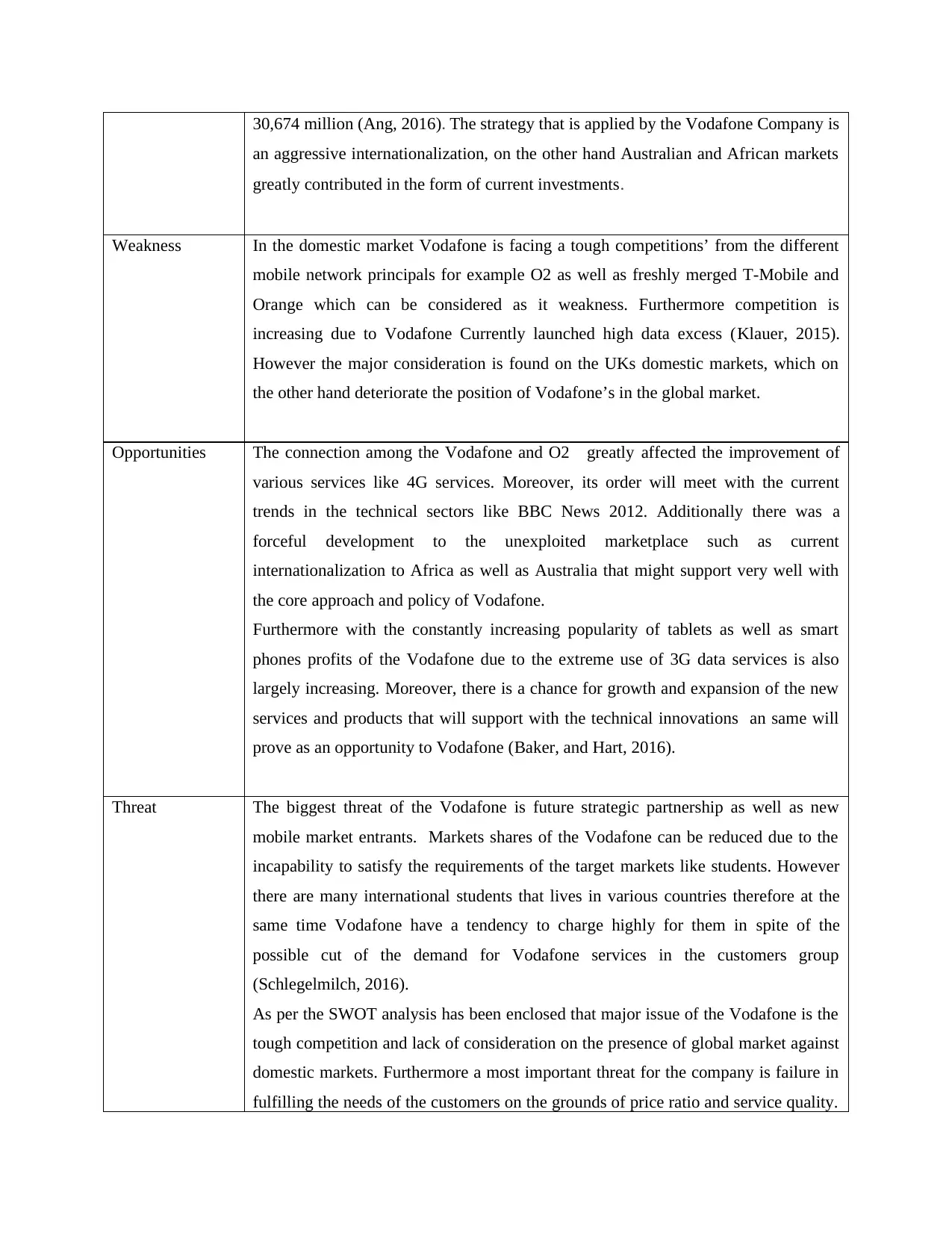
30,674 million (Ang, 2016). The strategy that is applied by the Vodafone Company is
an aggressive internationalization, on the other hand Australian and African markets
greatly contributed in the form of current investments.
Weakness In the domestic market Vodafone is facing a tough competitions’ from the different
mobile network principals for example O2 as well as freshly merged T-Mobile and
Orange which can be considered as it weakness. Furthermore competition is
increasing due to Vodafone Currently launched high data excess (Klauer, 2015).
However the major consideration is found on the UKs domestic markets, which on
the other hand deteriorate the position of Vodafone’s in the global market.
Opportunities The connection among the Vodafone and O2 greatly affected the improvement of
various services like 4G services. Moreover, its order will meet with the current
trends in the technical sectors like BBC News 2012. Additionally there was a
forceful development to the unexploited marketplace such as current
internationalization to Africa as well as Australia that might support very well with
the core approach and policy of Vodafone.
Furthermore with the constantly increasing popularity of tablets as well as smart
phones profits of the Vodafone due to the extreme use of 3G data services is also
largely increasing. Moreover, there is a chance for growth and expansion of the new
services and products that will support with the technical innovations an same will
prove as an opportunity to Vodafone (Baker, and Hart, 2016).
Threat The biggest threat of the Vodafone is future strategic partnership as well as new
mobile market entrants. Markets shares of the Vodafone can be reduced due to the
incapability to satisfy the requirements of the target markets like students. However
there are many international students that lives in various countries therefore at the
same time Vodafone have a tendency to charge highly for them in spite of the
possible cut of the demand for Vodafone services in the customers group
(Schlegelmilch, 2016).
As per the SWOT analysis has been enclosed that major issue of the Vodafone is the
tough competition and lack of consideration on the presence of global market against
domestic markets. Furthermore a most important threat for the company is failure in
fulfilling the needs of the customers on the grounds of price ratio and service quality.
an aggressive internationalization, on the other hand Australian and African markets
greatly contributed in the form of current investments.
Weakness In the domestic market Vodafone is facing a tough competitions’ from the different
mobile network principals for example O2 as well as freshly merged T-Mobile and
Orange which can be considered as it weakness. Furthermore competition is
increasing due to Vodafone Currently launched high data excess (Klauer, 2015).
However the major consideration is found on the UKs domestic markets, which on
the other hand deteriorate the position of Vodafone’s in the global market.
Opportunities The connection among the Vodafone and O2 greatly affected the improvement of
various services like 4G services. Moreover, its order will meet with the current
trends in the technical sectors like BBC News 2012. Additionally there was a
forceful development to the unexploited marketplace such as current
internationalization to Africa as well as Australia that might support very well with
the core approach and policy of Vodafone.
Furthermore with the constantly increasing popularity of tablets as well as smart
phones profits of the Vodafone due to the extreme use of 3G data services is also
largely increasing. Moreover, there is a chance for growth and expansion of the new
services and products that will support with the technical innovations an same will
prove as an opportunity to Vodafone (Baker, and Hart, 2016).
Threat The biggest threat of the Vodafone is future strategic partnership as well as new
mobile market entrants. Markets shares of the Vodafone can be reduced due to the
incapability to satisfy the requirements of the target markets like students. However
there are many international students that lives in various countries therefore at the
same time Vodafone have a tendency to charge highly for them in spite of the
possible cut of the demand for Vodafone services in the customers group
(Schlegelmilch, 2016).
As per the SWOT analysis has been enclosed that major issue of the Vodafone is the
tough competition and lack of consideration on the presence of global market against
domestic markets. Furthermore a most important threat for the company is failure in
fulfilling the needs of the customers on the grounds of price ratio and service quality.
Paraphrase This Document
Need a fresh take? Get an instant paraphrase of this document with our AI Paraphraser
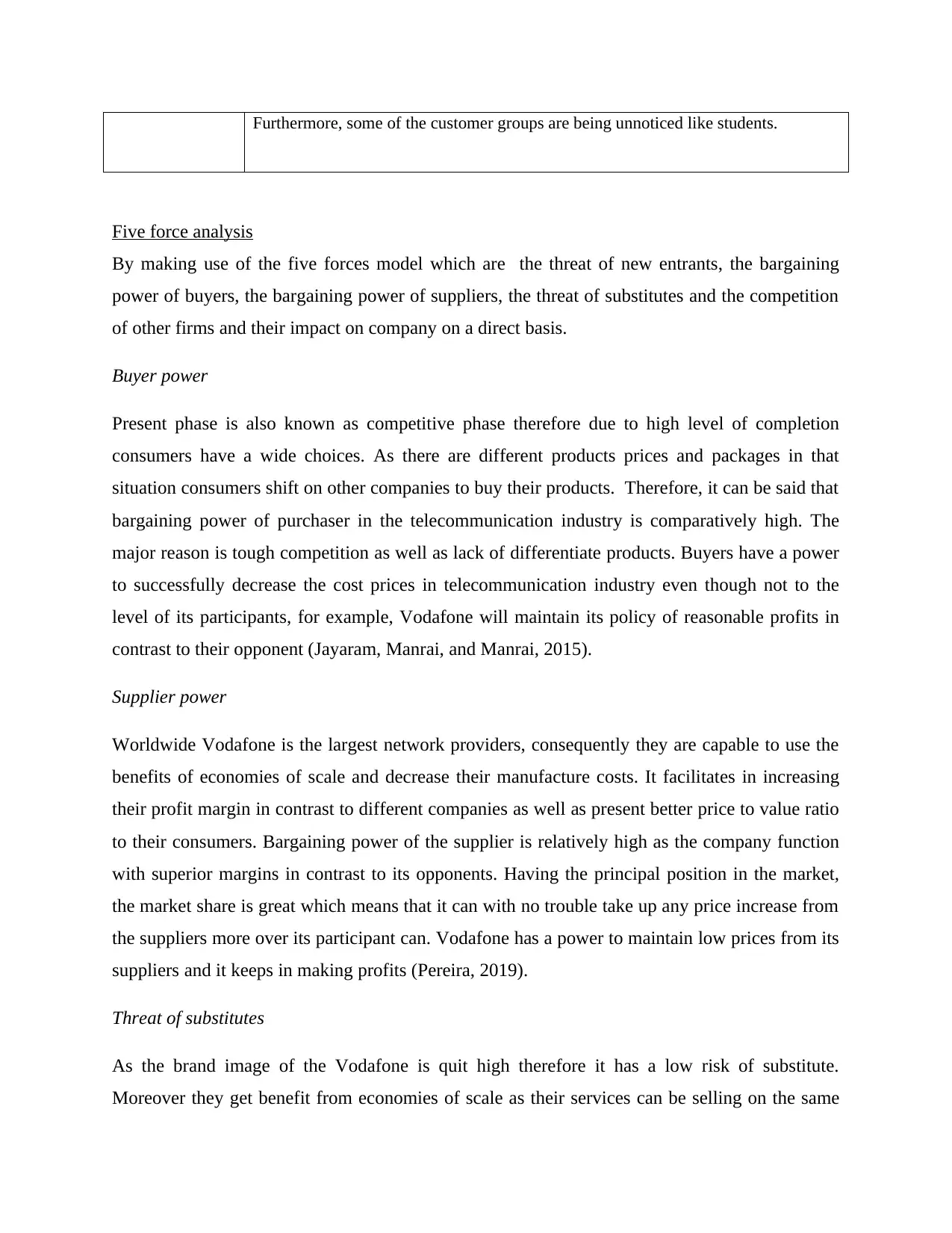
Furthermore, some of the customer groups are being unnoticed like students.
Five force analysis
By making use of the five forces model which are the threat of new entrants, the bargaining
power of buyers, the bargaining power of suppliers, the threat of substitutes and the competition
of other firms and their impact on company on a direct basis.
Buyer power
Present phase is also known as competitive phase therefore due to high level of completion
consumers have a wide choices. As there are different products prices and packages in that
situation consumers shift on other companies to buy their products. Therefore, it can be said that
bargaining power of purchaser in the telecommunication industry is comparatively high. The
major reason is tough competition as well as lack of differentiate products. Buyers have a power
to successfully decrease the cost prices in telecommunication industry even though not to the
level of its participants, for example, Vodafone will maintain its policy of reasonable profits in
contrast to their opponent (Jayaram, Manrai, and Manrai, 2015).
Supplier power
Worldwide Vodafone is the largest network providers, consequently they are capable to use the
benefits of economies of scale and decrease their manufacture costs. It facilitates in increasing
their profit margin in contrast to different companies as well as present better price to value ratio
to their consumers. Bargaining power of the supplier is relatively high as the company function
with superior margins in contrast to its opponents. Having the principal position in the market,
the market share is great which means that it can with no trouble take up any price increase from
the suppliers more over its participant can. Vodafone has a power to maintain low prices from its
suppliers and it keeps in making profits (Pereira, 2019).
Threat of substitutes
As the brand image of the Vodafone is quit high therefore it has a low risk of substitute.
Moreover they get benefit from economies of scale as their services can be selling on the same
Five force analysis
By making use of the five forces model which are the threat of new entrants, the bargaining
power of buyers, the bargaining power of suppliers, the threat of substitutes and the competition
of other firms and their impact on company on a direct basis.
Buyer power
Present phase is also known as competitive phase therefore due to high level of completion
consumers have a wide choices. As there are different products prices and packages in that
situation consumers shift on other companies to buy their products. Therefore, it can be said that
bargaining power of purchaser in the telecommunication industry is comparatively high. The
major reason is tough competition as well as lack of differentiate products. Buyers have a power
to successfully decrease the cost prices in telecommunication industry even though not to the
level of its participants, for example, Vodafone will maintain its policy of reasonable profits in
contrast to their opponent (Jayaram, Manrai, and Manrai, 2015).
Supplier power
Worldwide Vodafone is the largest network providers, consequently they are capable to use the
benefits of economies of scale and decrease their manufacture costs. It facilitates in increasing
their profit margin in contrast to different companies as well as present better price to value ratio
to their consumers. Bargaining power of the supplier is relatively high as the company function
with superior margins in contrast to its opponents. Having the principal position in the market,
the market share is great which means that it can with no trouble take up any price increase from
the suppliers more over its participant can. Vodafone has a power to maintain low prices from its
suppliers and it keeps in making profits (Pereira, 2019).
Threat of substitutes
As the brand image of the Vodafone is quit high therefore it has a low risk of substitute.
Moreover they get benefit from economies of scale as their services can be selling on the same
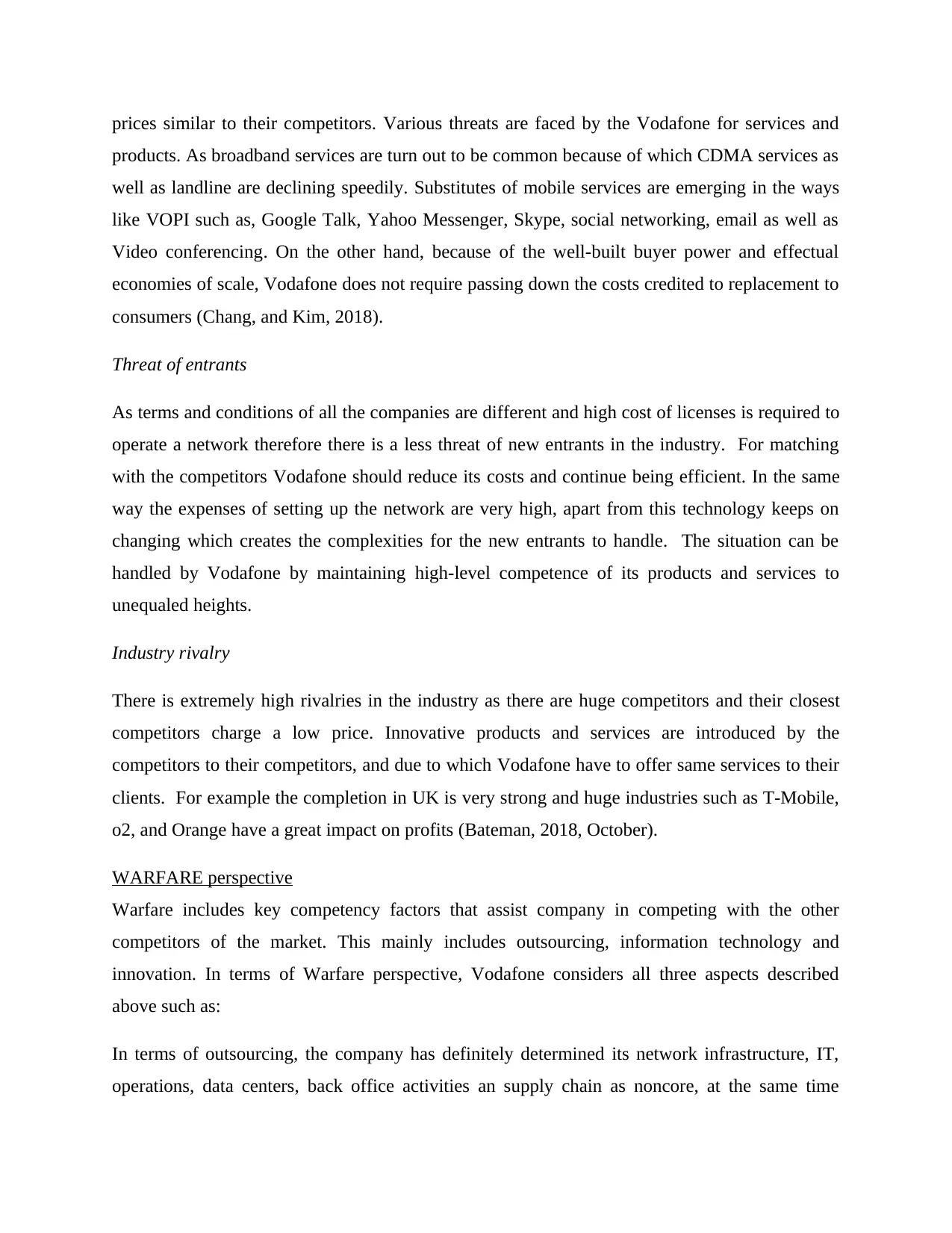
prices similar to their competitors. Various threats are faced by the Vodafone for services and
products. As broadband services are turn out to be common because of which CDMA services as
well as landline are declining speedily. Substitutes of mobile services are emerging in the ways
like VOPI such as, Google Talk, Yahoo Messenger, Skype, social networking, email as well as
Video conferencing. On the other hand, because of the well-built buyer power and effectual
economies of scale, Vodafone does not require passing down the costs credited to replacement to
consumers (Chang, and Kim, 2018).
Threat of entrants
As terms and conditions of all the companies are different and high cost of licenses is required to
operate a network therefore there is a less threat of new entrants in the industry. For matching
with the competitors Vodafone should reduce its costs and continue being efficient. In the same
way the expenses of setting up the network are very high, apart from this technology keeps on
changing which creates the complexities for the new entrants to handle. The situation can be
handled by Vodafone by maintaining high-level competence of its products and services to
unequaled heights.
Industry rivalry
There is extremely high rivalries in the industry as there are huge competitors and their closest
competitors charge a low price. Innovative products and services are introduced by the
competitors to their competitors, and due to which Vodafone have to offer same services to their
clients. For example the completion in UK is very strong and huge industries such as T-Mobile,
o2, and Orange have a great impact on profits (Bateman, 2018, October).
WARFARE perspective
Warfare includes key competency factors that assist company in competing with the other
competitors of the market. This mainly includes outsourcing, information technology and
innovation. In terms of Warfare perspective, Vodafone considers all three aspects described
above such as:
In terms of outsourcing, the company has definitely determined its network infrastructure, IT,
operations, data centers, back office activities an supply chain as noncore, at the same time
products. As broadband services are turn out to be common because of which CDMA services as
well as landline are declining speedily. Substitutes of mobile services are emerging in the ways
like VOPI such as, Google Talk, Yahoo Messenger, Skype, social networking, email as well as
Video conferencing. On the other hand, because of the well-built buyer power and effectual
economies of scale, Vodafone does not require passing down the costs credited to replacement to
consumers (Chang, and Kim, 2018).
Threat of entrants
As terms and conditions of all the companies are different and high cost of licenses is required to
operate a network therefore there is a less threat of new entrants in the industry. For matching
with the competitors Vodafone should reduce its costs and continue being efficient. In the same
way the expenses of setting up the network are very high, apart from this technology keeps on
changing which creates the complexities for the new entrants to handle. The situation can be
handled by Vodafone by maintaining high-level competence of its products and services to
unequaled heights.
Industry rivalry
There is extremely high rivalries in the industry as there are huge competitors and their closest
competitors charge a low price. Innovative products and services are introduced by the
competitors to their competitors, and due to which Vodafone have to offer same services to their
clients. For example the completion in UK is very strong and huge industries such as T-Mobile,
o2, and Orange have a great impact on profits (Bateman, 2018, October).
WARFARE perspective
Warfare includes key competency factors that assist company in competing with the other
competitors of the market. This mainly includes outsourcing, information technology and
innovation. In terms of Warfare perspective, Vodafone considers all three aspects described
above such as:
In terms of outsourcing, the company has definitely determined its network infrastructure, IT,
operations, data centers, back office activities an supply chain as noncore, at the same time
⊘ This is a preview!⊘
Do you want full access?
Subscribe today to unlock all pages.

Trusted by 1+ million students worldwide
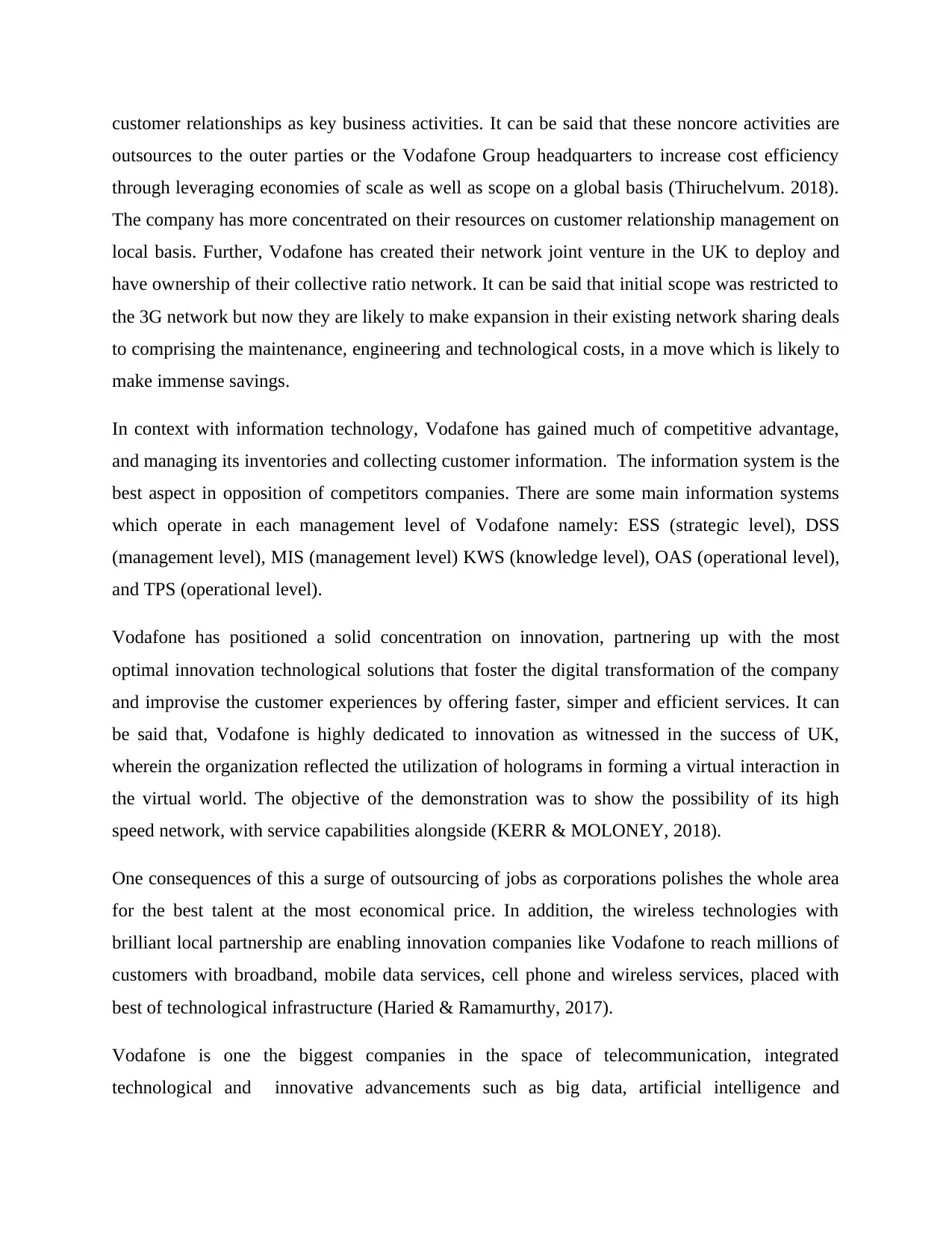
customer relationships as key business activities. It can be said that these noncore activities are
outsources to the outer parties or the Vodafone Group headquarters to increase cost efficiency
through leveraging economies of scale as well as scope on a global basis (Thiruchelvum. 2018).
The company has more concentrated on their resources on customer relationship management on
local basis. Further, Vodafone has created their network joint venture in the UK to deploy and
have ownership of their collective ratio network. It can be said that initial scope was restricted to
the 3G network but now they are likely to make expansion in their existing network sharing deals
to comprising the maintenance, engineering and technological costs, in a move which is likely to
make immense savings.
In context with information technology, Vodafone has gained much of competitive advantage,
and managing its inventories and collecting customer information. The information system is the
best aspect in opposition of competitors companies. There are some main information systems
which operate in each management level of Vodafone namely: ESS (strategic level), DSS
(management level), MIS (management level) KWS (knowledge level), OAS (operational level),
and TPS (operational level).
Vodafone has positioned a solid concentration on innovation, partnering up with the most
optimal innovation technological solutions that foster the digital transformation of the company
and improvise the customer experiences by offering faster, simper and efficient services. It can
be said that, Vodafone is highly dedicated to innovation as witnessed in the success of UK,
wherein the organization reflected the utilization of holograms in forming a virtual interaction in
the virtual world. The objective of the demonstration was to show the possibility of its high
speed network, with service capabilities alongside (KERR & MOLONEY, 2018).
One consequences of this a surge of outsourcing of jobs as corporations polishes the whole area
for the best talent at the most economical price. In addition, the wireless technologies with
brilliant local partnership are enabling innovation companies like Vodafone to reach millions of
customers with broadband, mobile data services, cell phone and wireless services, placed with
best of technological infrastructure (Haried & Ramamurthy, 2017).
Vodafone is one the biggest companies in the space of telecommunication, integrated
technological and innovative advancements such as big data, artificial intelligence and
outsources to the outer parties or the Vodafone Group headquarters to increase cost efficiency
through leveraging economies of scale as well as scope on a global basis (Thiruchelvum. 2018).
The company has more concentrated on their resources on customer relationship management on
local basis. Further, Vodafone has created their network joint venture in the UK to deploy and
have ownership of their collective ratio network. It can be said that initial scope was restricted to
the 3G network but now they are likely to make expansion in their existing network sharing deals
to comprising the maintenance, engineering and technological costs, in a move which is likely to
make immense savings.
In context with information technology, Vodafone has gained much of competitive advantage,
and managing its inventories and collecting customer information. The information system is the
best aspect in opposition of competitors companies. There are some main information systems
which operate in each management level of Vodafone namely: ESS (strategic level), DSS
(management level), MIS (management level) KWS (knowledge level), OAS (operational level),
and TPS (operational level).
Vodafone has positioned a solid concentration on innovation, partnering up with the most
optimal innovation technological solutions that foster the digital transformation of the company
and improvise the customer experiences by offering faster, simper and efficient services. It can
be said that, Vodafone is highly dedicated to innovation as witnessed in the success of UK,
wherein the organization reflected the utilization of holograms in forming a virtual interaction in
the virtual world. The objective of the demonstration was to show the possibility of its high
speed network, with service capabilities alongside (KERR & MOLONEY, 2018).
One consequences of this a surge of outsourcing of jobs as corporations polishes the whole area
for the best talent at the most economical price. In addition, the wireless technologies with
brilliant local partnership are enabling innovation companies like Vodafone to reach millions of
customers with broadband, mobile data services, cell phone and wireless services, placed with
best of technological infrastructure (Haried & Ramamurthy, 2017).
Vodafone is one the biggest companies in the space of telecommunication, integrated
technological and innovative advancements such as big data, artificial intelligence and
Paraphrase This Document
Need a fresh take? Get an instant paraphrase of this document with our AI Paraphraser
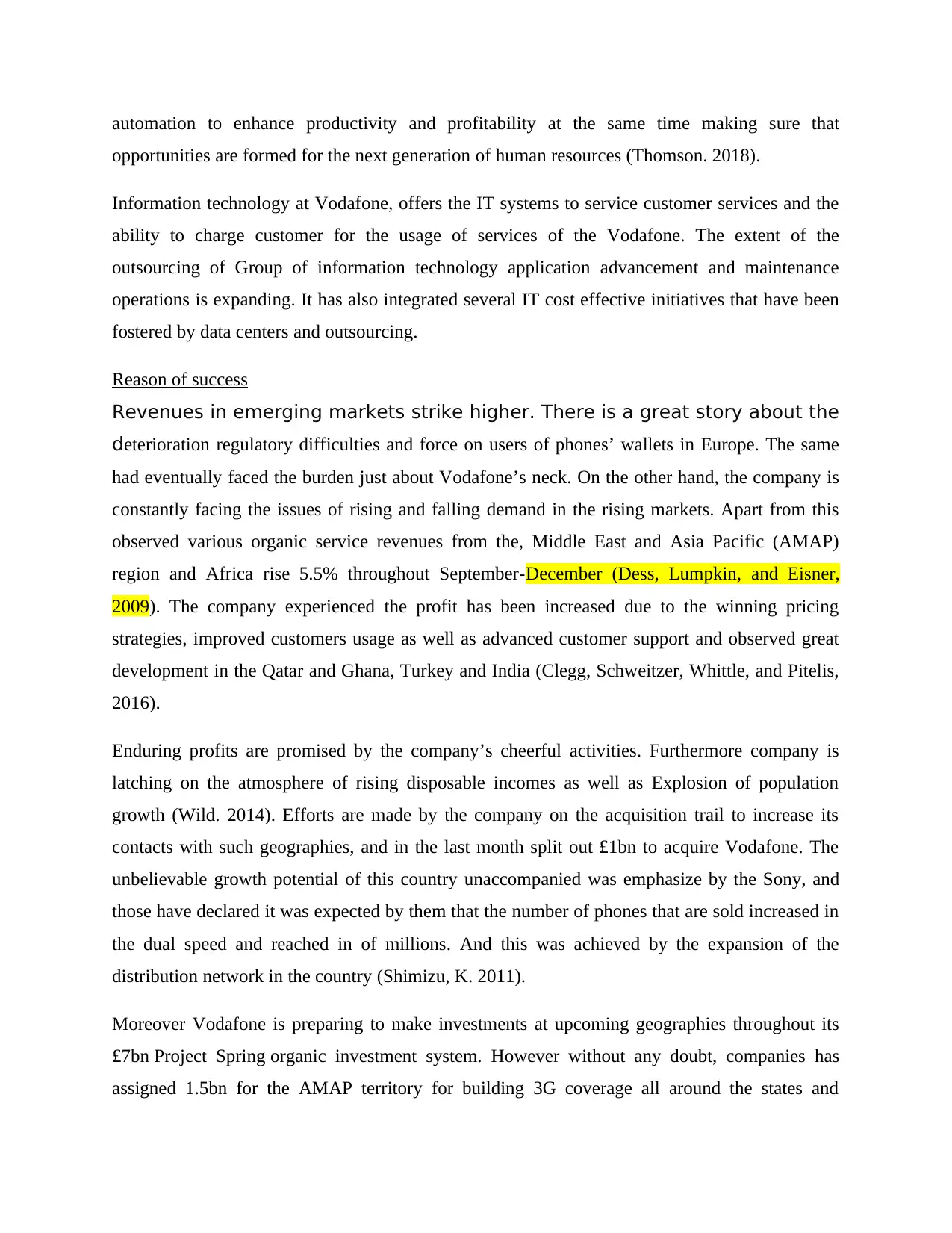
automation to enhance productivity and profitability at the same time making sure that
opportunities are formed for the next generation of human resources (Thomson. 2018).
Information technology at Vodafone, offers the IT systems to service customer services and the
ability to charge customer for the usage of services of the Vodafone. The extent of the
outsourcing of Group of information technology application advancement and maintenance
operations is expanding. It has also integrated several IT cost effective initiatives that have been
fostered by data centers and outsourcing.
Reason of success
Revenues in emerging markets strike higher. There is a great story about the
deterioration regulatory difficulties and force on users of phones’ wallets in Europe. The same
had eventually faced the burden just about Vodafone’s neck. On the other hand, the company is
constantly facing the issues of rising and falling demand in the rising markets. Apart from this
observed various organic service revenues from the, Middle East and Asia Pacific (AMAP)
region and Africa rise 5.5% throughout September-December (Dess, Lumpkin, and Eisner,
2009). The company experienced the profit has been increased due to the winning pricing
strategies, improved customers usage as well as advanced customer support and observed great
development in the Qatar and Ghana, Turkey and India (Clegg, Schweitzer, Whittle, and Pitelis,
2016).
Enduring profits are promised by the company’s cheerful activities. Furthermore company is
latching on the atmosphere of rising disposable incomes as well as Explosion of population
growth (Wild. 2014). Efforts are made by the company on the acquisition trail to increase its
contacts with such geographies, and in the last month split out £1bn to acquire Vodafone. The
unbelievable growth potential of this country unaccompanied was emphasize by the Sony, and
those have declared it was expected by them that the number of phones that are sold increased in
the dual speed and reached in of millions. And this was achieved by the expansion of the
distribution network in the country (Shimizu, K. 2011).
Moreover Vodafone is preparing to make investments at upcoming geographies throughout its
£7bn Project Spring organic investment system. However without any doubt, companies has
assigned 1.5bn for the AMAP territory for building 3G coverage all around the states and
opportunities are formed for the next generation of human resources (Thomson. 2018).
Information technology at Vodafone, offers the IT systems to service customer services and the
ability to charge customer for the usage of services of the Vodafone. The extent of the
outsourcing of Group of information technology application advancement and maintenance
operations is expanding. It has also integrated several IT cost effective initiatives that have been
fostered by data centers and outsourcing.
Reason of success
Revenues in emerging markets strike higher. There is a great story about the
deterioration regulatory difficulties and force on users of phones’ wallets in Europe. The same
had eventually faced the burden just about Vodafone’s neck. On the other hand, the company is
constantly facing the issues of rising and falling demand in the rising markets. Apart from this
observed various organic service revenues from the, Middle East and Asia Pacific (AMAP)
region and Africa rise 5.5% throughout September-December (Dess, Lumpkin, and Eisner,
2009). The company experienced the profit has been increased due to the winning pricing
strategies, improved customers usage as well as advanced customer support and observed great
development in the Qatar and Ghana, Turkey and India (Clegg, Schweitzer, Whittle, and Pitelis,
2016).
Enduring profits are promised by the company’s cheerful activities. Furthermore company is
latching on the atmosphere of rising disposable incomes as well as Explosion of population
growth (Wild. 2014). Efforts are made by the company on the acquisition trail to increase its
contacts with such geographies, and in the last month split out £1bn to acquire Vodafone. The
unbelievable growth potential of this country unaccompanied was emphasize by the Sony, and
those have declared it was expected by them that the number of phones that are sold increased in
the dual speed and reached in of millions. And this was achieved by the expansion of the
distribution network in the country (Shimizu, K. 2011).
Moreover Vodafone is preparing to make investments at upcoming geographies throughout its
£7bn Project Spring organic investment system. However without any doubt, companies has
assigned 1.5bn for the AMAP territory for building 3G coverage all around the states and
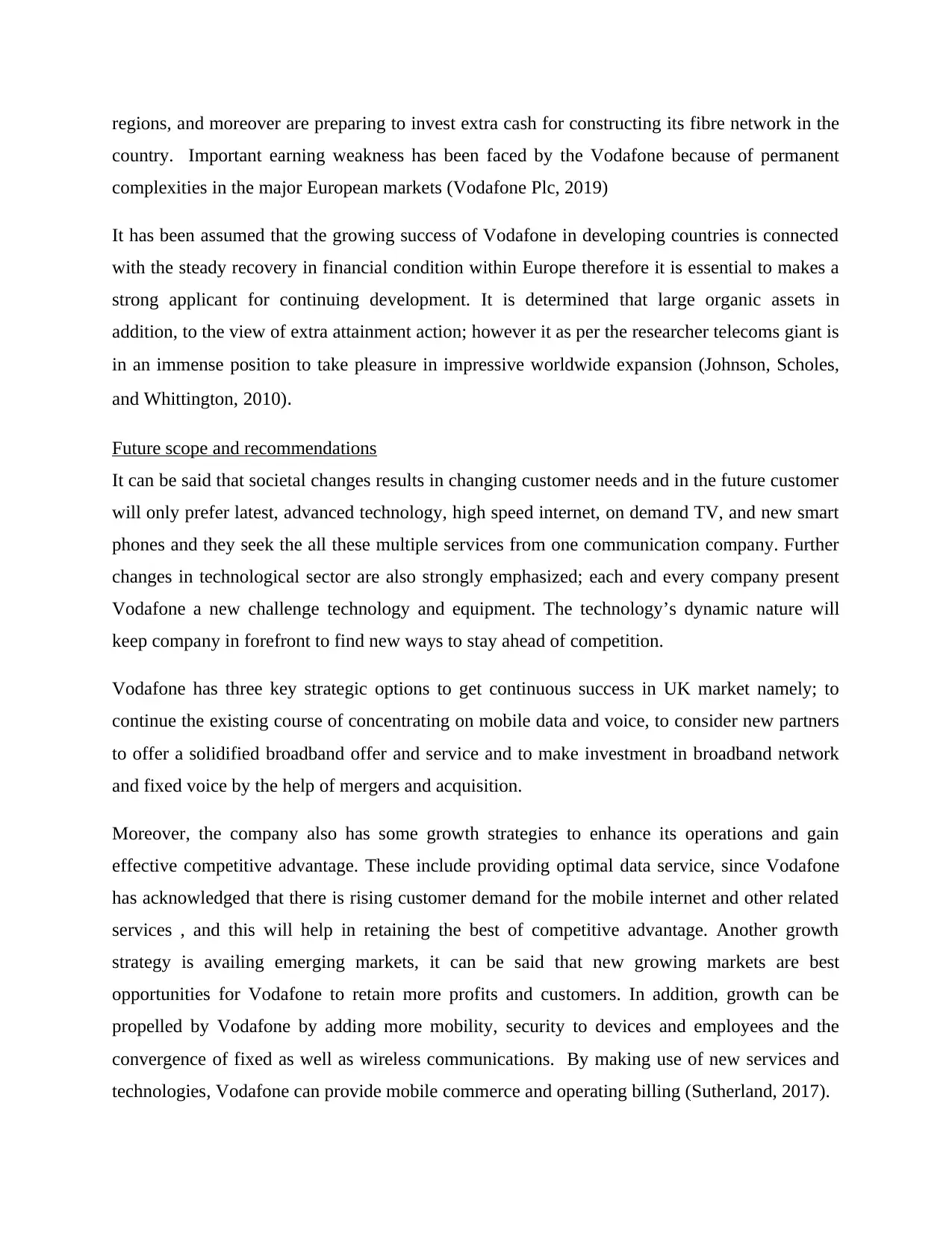
regions, and moreover are preparing to invest extra cash for constructing its fibre network in the
country. Important earning weakness has been faced by the Vodafone because of permanent
complexities in the major European markets (Vodafone Plc, 2019)
It has been assumed that the growing success of Vodafone in developing countries is connected
with the steady recovery in financial condition within Europe therefore it is essential to makes a
strong applicant for continuing development. It is determined that large organic assets in
addition, to the view of extra attainment action; however it as per the researcher telecoms giant is
in an immense position to take pleasure in impressive worldwide expansion (Johnson, Scholes,
and Whittington, 2010).
Future scope and recommendations
It can be said that societal changes results in changing customer needs and in the future customer
will only prefer latest, advanced technology, high speed internet, on demand TV, and new smart
phones and they seek the all these multiple services from one communication company. Further
changes in technological sector are also strongly emphasized; each and every company present
Vodafone a new challenge technology and equipment. The technology’s dynamic nature will
keep company in forefront to find new ways to stay ahead of competition.
Vodafone has three key strategic options to get continuous success in UK market namely; to
continue the existing course of concentrating on mobile data and voice, to consider new partners
to offer a solidified broadband offer and service and to make investment in broadband network
and fixed voice by the help of mergers and acquisition.
Moreover, the company also has some growth strategies to enhance its operations and gain
effective competitive advantage. These include providing optimal data service, since Vodafone
has acknowledged that there is rising customer demand for the mobile internet and other related
services , and this will help in retaining the best of competitive advantage. Another growth
strategy is availing emerging markets, it can be said that new growing markets are best
opportunities for Vodafone to retain more profits and customers. In addition, growth can be
propelled by Vodafone by adding more mobility, security to devices and employees and the
convergence of fixed as well as wireless communications. By making use of new services and
technologies, Vodafone can provide mobile commerce and operating billing (Sutherland, 2017).
country. Important earning weakness has been faced by the Vodafone because of permanent
complexities in the major European markets (Vodafone Plc, 2019)
It has been assumed that the growing success of Vodafone in developing countries is connected
with the steady recovery in financial condition within Europe therefore it is essential to makes a
strong applicant for continuing development. It is determined that large organic assets in
addition, to the view of extra attainment action; however it as per the researcher telecoms giant is
in an immense position to take pleasure in impressive worldwide expansion (Johnson, Scholes,
and Whittington, 2010).
Future scope and recommendations
It can be said that societal changes results in changing customer needs and in the future customer
will only prefer latest, advanced technology, high speed internet, on demand TV, and new smart
phones and they seek the all these multiple services from one communication company. Further
changes in technological sector are also strongly emphasized; each and every company present
Vodafone a new challenge technology and equipment. The technology’s dynamic nature will
keep company in forefront to find new ways to stay ahead of competition.
Vodafone has three key strategic options to get continuous success in UK market namely; to
continue the existing course of concentrating on mobile data and voice, to consider new partners
to offer a solidified broadband offer and service and to make investment in broadband network
and fixed voice by the help of mergers and acquisition.
Moreover, the company also has some growth strategies to enhance its operations and gain
effective competitive advantage. These include providing optimal data service, since Vodafone
has acknowledged that there is rising customer demand for the mobile internet and other related
services , and this will help in retaining the best of competitive advantage. Another growth
strategy is availing emerging markets, it can be said that new growing markets are best
opportunities for Vodafone to retain more profits and customers. In addition, growth can be
propelled by Vodafone by adding more mobility, security to devices and employees and the
convergence of fixed as well as wireless communications. By making use of new services and
technologies, Vodafone can provide mobile commerce and operating billing (Sutherland, 2017).
⊘ This is a preview!⊘
Do you want full access?
Subscribe today to unlock all pages.

Trusted by 1+ million students worldwide
1 out of 16
Related Documents
Your All-in-One AI-Powered Toolkit for Academic Success.
+13062052269
info@desklib.com
Available 24*7 on WhatsApp / Email
![[object Object]](/_next/static/media/star-bottom.7253800d.svg)
Unlock your academic potential
Copyright © 2020–2026 A2Z Services. All Rights Reserved. Developed and managed by ZUCOL.


